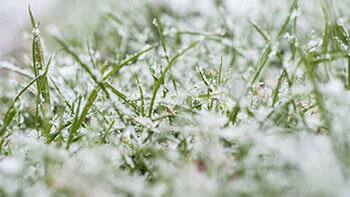Jumpstart spring with late-winter lawn, garden care
Feb 10, 2020

By Dawn Matlock, TFC Turf and Ornamental Coordinator
March is almost here — the month when lawns and gardens begin waking up and “green thumbs” start itching to get outdoors. While the strong possibility of frosty nights and freezing weather still persists, there are many tasks that can be accomplished this time of year to satisfy the urge to start planting and result in a more beautiful yard, garden, and landscape once warm weather arrives. Keep in mind that timing and proper techniques are important for many of these late winter and early spring jobs.
• Spring is a good time to renew and add variety to your landscape. Buy some new perennials for your flower border.
• Trees that “bleed,” such as birch and maple, should not be pruned until after the leaves are fully developed.
• Plan your vegetable garden on paper to utilize the space most efficiently. Remember to rotate the location of vegetable plants from previous years to reduce insect and disease problems.
• Be sure to pick a permanent spot in the garden for herbs. Many of them will come up year after year.
• Turn the compost pile.
• Go after slugs this month. Every one you get will help control the population of these pests.
• Finish pruning evergreens early in the month. Cut to shape and control plant size.
• Clean up rose beds, removing any fallen leaves from last season. Refresh mulch around roses. Feed with a slow-release fertilizer. As new leaves emerge, start spraying for black spot.
• Have your soil tested if you have not done so for your lawn or garden in the past three or four years.
• Grubs become more active this month and feast on grass before molting. Check with your local Co-op to learn which treatments work best.
• Get the jump on crabgrass by applying a pre-emergent herbicide. Time applications to coincide with forsythia flowering.
• Cut English ivy back hard. When new growth emerges in spring, it will be strong and healthy.
• Wait to plant warm-season annuals such as tomatoes, peppers, squash, okra, sweet potatoes, and watermelons after all danger of frost has passed and the soil temperature has warmed to about 60 degrees.
• Cutworms can cause considerable damage during this time of year. Keep an eye out if you have susceptible crops such as lettuce and other greens.
• Aphids can seem to appear out of nowhere in March and start damaging crops and ornamentals. These pests can be controlled with the appropriate sprays.
• Now is a good time for lawn-feeding with an all-purpose or slow-release fertilizer.
• When the weather is fair, add more seed to your lawn. If you have a thick layer of thatch, you should remove it now.
If you get overwhelmed, remember that the experts at your local Co-op can help you with advice and product selection to make the most out of your spring lawn and garden chores.
March is almost here — the month when lawns and gardens begin waking up and “green thumbs” start itching to get outdoors. While the strong possibility of frosty nights and freezing weather still persists, there are many tasks that can be accomplished this time of year to satisfy the urge to start planting and result in a more beautiful yard, garden, and landscape once warm weather arrives. Keep in mind that timing and proper techniques are important for many of these late winter and early spring jobs.
• Spring is a good time to renew and add variety to your landscape. Buy some new perennials for your flower border.
• Trees that “bleed,” such as birch and maple, should not be pruned until after the leaves are fully developed.
• Plan your vegetable garden on paper to utilize the space most efficiently. Remember to rotate the location of vegetable plants from previous years to reduce insect and disease problems.
• Be sure to pick a permanent spot in the garden for herbs. Many of them will come up year after year.
• Turn the compost pile.
• Go after slugs this month. Every one you get will help control the population of these pests.
• Finish pruning evergreens early in the month. Cut to shape and control plant size.
• Clean up rose beds, removing any fallen leaves from last season. Refresh mulch around roses. Feed with a slow-release fertilizer. As new leaves emerge, start spraying for black spot.
• Have your soil tested if you have not done so for your lawn or garden in the past three or four years.
• Grubs become more active this month and feast on grass before molting. Check with your local Co-op to learn which treatments work best.
• Get the jump on crabgrass by applying a pre-emergent herbicide. Time applications to coincide with forsythia flowering.
• Cut English ivy back hard. When new growth emerges in spring, it will be strong and healthy.
• Wait to plant warm-season annuals such as tomatoes, peppers, squash, okra, sweet potatoes, and watermelons after all danger of frost has passed and the soil temperature has warmed to about 60 degrees.
• Cutworms can cause considerable damage during this time of year. Keep an eye out if you have susceptible crops such as lettuce and other greens.
• Aphids can seem to appear out of nowhere in March and start damaging crops and ornamentals. These pests can be controlled with the appropriate sprays.
• Now is a good time for lawn-feeding with an all-purpose or slow-release fertilizer.
• When the weather is fair, add more seed to your lawn. If you have a thick layer of thatch, you should remove it now.
If you get overwhelmed, remember that the experts at your local Co-op can help you with advice and product selection to make the most out of your spring lawn and garden chores.